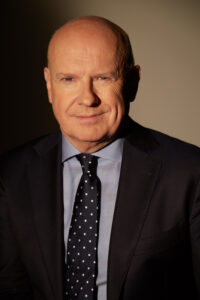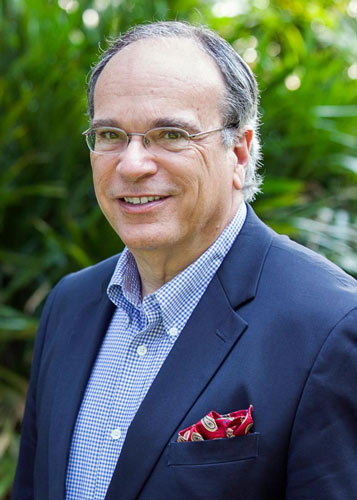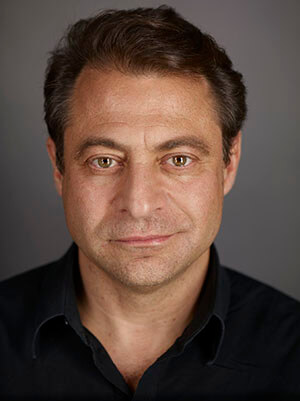The Thomas H. Quinn Lecture Series
The Thomas H. Quinn Lecture Series is an annual event hosted by the Mendoza College of Business to honor the Notre Dame alumnus and former member and chair of Mendoza’s Business Advisory Council. Quinn earned a bachelor’s degree in economics from Notre Dame in 1969 and was a football monogram winner and member of the 1966 national championship team.
Quinn was a managing partner and member of the investment committee and management committee of private investment firm The Jordan Company as well as the president and chief operating officer of Chicago-based Jordan Industries Inc. Quinn died April 29, 2016, at the age of 68. The Quinn Lecture is sponsored by Notre Dame alumnus and trustee John W. “Jay” Jordan II, Quinn’s college roommate, longtime friend and business partner.
Fall 2024
Friday, November 8
3:30 p.m. – 4:30 p.m.
Jordan Auditorium, Mendoza College of Business
No registration or tickets required. Seating is limited. Open to all Notre Dame students, faculty, staff and campus visitors.

Gerry Baker
Gerry Baker is Editor at Large of The Wall Street Journal. His weekly column for the editorial page, “Free Expression,” appears in The Wall Street Journal each Tuesday. Mr. Baker is also host of “WSJ at Large with Gerry Baker,” a weekly news and current affairs interview show on the Fox Business Network, and the weekly WSJ Opinion podcast “Free Expression” where he speaks with some of the world’s leading writers, influencers and thinkers about a variety of subjects.
Mr. Baker previously served as Editor in Chief of The Wall Street Journal and Dow Jones from 2013-2018. Prior to that, Mr. Baker was Deputy Editor in Chief of The Wall Street Journal from 2009-2013. He has been a journalist for more than 30 years, writing and broadcasting for some of the world’s most famous news organizations, including his tenure at The Financial Times, The Times of London, and The BBC.
Moderated by Matthew E. K. Hall, Director, Rooney Center for the Study of American Democracy.
Fall 2023
This is a free but ticketed event. Tickets will be available for pick-up at the Ticket Office one hour prior to the event. There are no advanced reservations for this event. Limit 2 tickets per person. Tickets may be obtained on September 15th thru the DeBartolo Performing Arts Center.

This is a free but ticketed event. Tickets will be available for pick-up at the DeBartolo Performing Arts Center Ticket Office one hour prior to the event.
Steve Levitt co-authored Freakonomics, which spent over 2 years on the New York Times Best Seller list and has sold more than 4 million copies worldwide. SuperFreakonomics, released in 2009, includes brand new research on topics from terrorism to prostitution to global warming. Steve is also the co-author of the popular Freakonomics Blog.
Steve Levitt Bio:
When mild-mannered economist Steven D. Levitt published a paper linking a rise in abortion to a drop in crime, it set off a firestorm of controversy and had both the conservatives and liberals up in arms. But Levitt has no political agenda and is the last person to be called a moralist. He is a brilliant but uncomplicated man who uses simple questions to reach startling conclusions. The Wall Street Journal has said “If Indiana Jones were an economist, he’d be Steven Levitt,” he has shown other economists just how well their tools can make sense of the real world.
Steven Levitt is a tenured professor in the University of Chicago’s economics department (he received tenure after only two years) and was the 2003 recipient of the American Economic Association’s prestigious John Bates Clark Medal, given to the country’s best economist under 40.
When Stephen Dubner (co-author of Freakonomics, SuperFreakonomics, Think Like A Freak and When To Rob a Bank) profiled Levitt in The New York Times Magazine, he was beset by questions, queries, riddles and requests—from General Motors and the New York Yankees and U.S. senators but also from prisoners and parents and a man who sold bagels. A former Tour de France champion called him to ask his help in proving that the current Tour is rife with doping; the CIA wanted to know how Levitt might use data to catch terrorists.
Originally published in the U.S. in 2005, Freakonomics instantly became a cultural phenomenon. Hailed by critics and readers alike, it went on to spend more than eight years on The New York Times bestseller list, having sold more than seven million copies around the world, in more than 40 countries. Levitt and Dubner have appeared widely on television and maintain the popular Freakonomics blog, which can be found on The New York Times website. Through forceful storytelling and wry insight, Levitt shows how economics is, at root, the study of incentives— that is, how people get what they want, or need, especially when other people want or need the same thing. Freakonomics showed that the modern world, despite a great deal of complexity and downright deceit, is not impenetrable, is not unknowable, and—if the right questions are asked—is even more intriguing than we think. All it takes is a new way of looking.
A book that was even bolder, funnier, and more surprising than the first, SuperFreakonomics retained that off-kilter sensibility (comparing, for instance, the relative dangers of driving while drunk versus walking while drunk) but also tackled a host of issues at the very center of modern society: terrorism, global warming, altruism, and more. Released in October 2010, the illustrated edition of SuperFreakonomics employed photographs, drawings, and graphs that led readers to see the world in a bold, fresh way.
Levitt’s third book with Dubner, Think Like A Freak, was released in May 2014 and also became an instant New York Times bestseller. Their latest book is called When To Rob A Bank and was released in May 2015.
Steven Levitt has an enormous curiosity and is set on course by personal experiences and the incongruities he sees in everyday life. He is an intuitionist. He sifts through a pile of data to find a story that no one else has found and devises ways to measure an effect that veteran economists have declared un-measurable.
Fall 2022

Tom V. Morris
https://www.tomvmorris.com/
Tom is one of the world’s top public philosophers and pioneering business thinkers. He’s the author of over 30 groundbreaking books and is a legendary speaker whose electrifying talks reengage people around their deepest values and reignite their passion for work and life. He’s now available by Zoom and other platforms as well as for in person talks to serve any business navigating our currently radical and disruptive change, bringing real wisdom to the challenge. As of Summer 2021, he is also offering consulting and advising services to a few executive clients. Contact Tom through the world’s oldest address, TomVMorris@aol.com, to connect.
Performance. Leadership. Success. Change. Commitment. Imagine the wisdom of Yoda, Gandalf, and Dumbledore, rolled together and linked to the spirit and energy of the world’s most winning athletic coaches. Stir in the unexpected humor of a Seinfeld or Fallon, and you have an idea of what Tom’s audiences experience. Bring him to your next event and find out why so many people call him, “The best speaker ever!” Today, he’s the philosophical guide for virtual events worldwide.
Tom’s newest book, hot off the press, is Plato’s Lemonade Stand: Stirring Change into Something Great. You know the old adage: “When life hands you lemons, make lemonade.” Everyone says it but nobody explains how to do it. Finally, the deepest wisdom of the great practical philosophers on how to move from difficulty to delight, and into that far country beyond the valuable qualities of resilience and grit, where true transformation happens. There is an art of change that can be applied to any challenge or adversity, a sort of spiritual alchemy that can use the sour lemons that come out way for truly great lemonade. This book gives the universal recipe for dealing well with challenge and leading change wisely and well!
Fall 2019
Author, The Culture Code
Bestselling author, The Little Book of Talent
Contributing editor, Outside magazine
“The Culture Code: Unlocking the New Science of Successful Groups”
3:30pm, November 15
Mendoza College of Business’ Jordan Auditorium
Lecture is free and open to the public.
Daniel Coyle is the award-winning, NY Times-bestselling author of several books on leadership and performance, including The Talent Code, The Little Book of Talent, and his newest book, The Culture Code: The Secrets of Highly Successful Groups.
The Culture Code was named one of Best Books of 2018 by Bloomberg and one of Amazon’s Best Business and Leadership Books. The book takes you inside some of the world’s most high-performing organizations includ¬ing Pixar, the San Antonio Spurs, and Navy SEALs Team Six, to demystify the culture-building process and provide simple, actionable tools that can spark buy-in, boost trust, and strengthen your organization’s culture.
A 1987 graduate of the University of Notre Dame, Coyle is a contributing editor at Outside magazine and has written for Sports Illustrated, The New York Times Magazine, and Play.
Fall 2017
 Exponential Tech: Innovation & Disruption on the Road Ahead
Exponential Tech: Innovation & Disruption on the Road Ahead
Peter H. Diamandis
International Pioneer in Innovation
Co-Founder of Singularity University
Fortune’s “The Worlds’s 50 Greatest Leaders”
The event if free and open to the public.
September 8, 2017
4:00pm – 5:15pm
Mendoza College of Business, Jordan Auditorium
A pioneer in commercial spaceflight, Diamandis’ talk will describe the power of “exponential tech,” a phrase that refers to technology’s potential to bring about revolutionary change to business, health care, education and lifestyles in general on a global basis. Diamandis cites the large-scale disruptions already brought about by “exponential entrepreneurs” that have created companies such as Uber, Airbnb, SpaceX and Tesla.
Sponsored by the Thomas H. Quinn Lecture Series.
